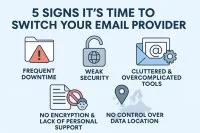
There are endless storage options available when it comes to email data. The main thing to consider is that you want to be able to find a storage option that is truly unique. If you think about this process, you will find that the biggest concern is to find the right kind of service that truly stands out for being efficient an reliable.
The following points will give you a good number of options to consider. This is going to be essential if you wish to be successful in this process.
The use of cloud storage has revolutionized data management, offering unparalleled accessibility and scalability. However, when it comes to storing emails containing personal information of EU citizens, a meticulous approach is necessary due to the stringent EU data protection laws, most notably the General Data Protection Regulation (GDPR). Adhering to GDPR's stipulations for the collection, storage, and processing of personal data, including email addresses, is imperative to avoid substantial fines and legal ramifications.
Unlike the way things work in the EU, the United States lacks a comprehensive federal data protection law. Instead, it relies on sector-specific regulations governing various industries. For entities dealing with email storage and sensitive data, compliance necessitates an understanding of the relevant regulations applicable to their specific industry. This complexity requires a measured and diligent approach.
The complete absence of a unified federal data protection law in the US results in challenges surrounding email storage. Each industry is subject to distinct requirements and data retention periods, making it arduous for organizations to adopt a standardized approach to data storage. Additionally, concerns over privacy, surveillance, and data breaches elevate the importance of safeguarding stored email data.
The data retention requirements within the EU dictate that personal data should not be retained for longer than necessary for its original purpose. Organizations operating within the EU must comprehend these data retention periods and implement measures to ensure the deletion or anonymization of data after the designated timeframe has lapsed. This focus on data privacy underscores the significance of regulatory compliance.
Cost considerations are paramount when deciding on email data storage options. While the US may appear to offer more cost-effective solutions due to its less stringent data protection laws, the risk of non-compliance and potential financial penalties should not be underestimated. On the other hand, the EU's rigorous data protection framework may lead to higher storage costs, but it reinforces trust with customers through robust privacy measures.
Maintaining compliance to the US data protection laws requires vigilance and legal expertise. You can’t afford to miss out on any compliance updates. Organizations must prioritize compliance with sector-specific regulations to mitigate legal risks and ensure the protection of sensitive email data. Implementing robust data protection measures and conducting regular audits are essential steps in meeting regulatory obligations.
When it comes to cybersquatting, we all know that security concerns related to email storage extend beyond data breaches worldwide. Cyberattacks, ransomware, and unauthorized access pose significant threats to stored email data. To counter these risks, businesses must invest in advanced security measures and best practices.
Data sovereignty is something to always consider and the legal concept that data is subject to the laws of the country where it resides, introduces complexities when storing data in multiple jurisdictions. Awareness of data sovereignty implications is essential for complying with relevant laws and ensuring data protection.
There are some unique advantages and drawbacks to most storage options. Storing data in the EU ensures adherence to robust data protection laws, bolstering customer confidence in data privacy. Nevertheless, this may entail higher costs and stricter data retention requirements. Conversely, opting for US storage solutions may appear economically favorable, but it necessitates vigilance to navigate the intricacies of sector-specific regulations and potential legal liabilities.
Being able to choose an appropriate email storage option under EU or US law is a strategic decision for organizations. By comprehensively analyzing the various factors, including regulations, security, and costs, businesses can make informed choices that align with their objectives and ensure compliance with applicable laws.
Being able to secure the storage of emails is essential in time when data privacy is so prevalent. It is always about finding proper balance between regulatory compliance, robust security, and cost-effectiveness will empower organizations to ensure the safe storage of email data while abiding by the relevant legal requirements.
![]() © 2022 - 2025 HostingBe.com Simple CMS versie 3.1.0
© 2022 - 2025 HostingBe.com Simple CMS versie 3.1.0